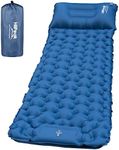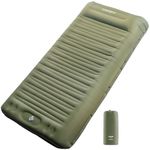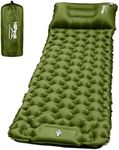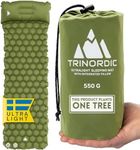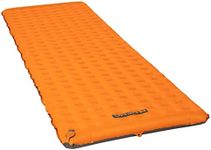Buying Guide for the Best Camping Mats
Choosing the right camping mat is essential for a comfortable and restful night's sleep outdoors. A good camping mat provides insulation from the cold ground, cushioning for comfort, and can significantly enhance your camping experience. When selecting a camping mat, consider factors such as the type of camping you will be doing, the climate, and your personal comfort preferences. Here are some key specifications to help you make an informed decision.Type of MatCamping mats come in various types, including self-inflating mats, air mats, and closed-cell foam mats. Self-inflating mats offer a balance of comfort and insulation, making them suitable for most camping conditions. Air mats are lightweight and compact, ideal for backpacking, but may require a pump or manual inflation. Closed-cell foam mats are durable and provide good insulation, but they are bulkier and less comfortable. Choose the type based on your camping style and the level of comfort you desire.
R-ValueThe R-value measures the mat's ability to insulate you from the cold ground. Higher R-values indicate better insulation. For summer camping, an R-value of 1-2 is usually sufficient. For three-season camping, look for an R-value of 2-4. For winter camping, an R-value of 4 or higher is recommended. Consider the typical weather conditions you will encounter and choose a mat with an appropriate R-value to ensure warmth and comfort.
ThicknessThe thickness of a camping mat affects both comfort and insulation. Thicker mats provide more cushioning and are generally more comfortable, especially for side sleepers. However, they can be bulkier and heavier. Mats with a thickness of 1-2 inches are suitable for lightweight backpacking, while those with 2-4 inches offer more comfort for car camping or base camping. Consider your sleeping preferences and the type of camping you will be doing when selecting the thickness.
Weight and PackabilityWeight and packability are crucial for backpackers who need to carry their gear over long distances. Lightweight and compact mats are easier to carry but may sacrifice some comfort and insulation. Mats weighing less than 1 pound are ideal for ultralight backpacking. For general backpacking, mats weighing 1-2 pounds offer a good balance of comfort and portability. If you are car camping, weight and packability are less of a concern, so you can opt for a more comfortable and bulkier mat.
DurabilityDurability is important, especially if you plan to use the mat frequently or in rugged conditions. Look for mats made from high-quality materials that can withstand rough surfaces and repeated use. Closed-cell foam mats are generally the most durable, while air mats can be prone to punctures. Self-inflating mats offer a good balance of durability and comfort. Consider the terrain and frequency of use when evaluating the durability of a camping mat.
SizeCamping mats come in various sizes, including regular, long, and wide options. The size you choose should match your body size and sleeping style. Regular mats are typically around 72 inches long and 20 inches wide, suitable for most people. Long mats are around 78 inches long, ideal for taller individuals. Wide mats offer extra width for those who move around a lot in their sleep. Ensure the mat provides enough space for you to sleep comfortably without adding unnecessary weight or bulk.

